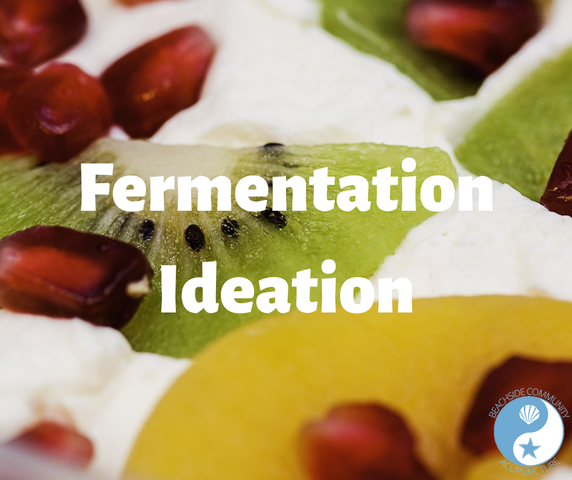
This post contains affiliate links, meaning Beachside Community Acupuncture PLLC may receive a small commission for purchases made through certain links at no additional cost to you. (In other words, you support us in a small way when you buy the products that we highly recommend and would use ourselves!) Click here to view our full disclosure policy.
"Microbiome" is a buzz word in modern health, but our ancestors kept their symbiotic microorganisms happy without having to think about it. While probiotics taken in supplement form can give you a large dose of "good" bacteria, fermented foods naturally contain cultures of beneficial microbes. Some examples are...
- Kombucha: fermented tea
- Sourdough: fermented flour and water
- Sauerkraut: fermented cabbage
- Pickles: fermented cucumbers
- Kimchi: fermented vegetables (with seasonings)
- Yogurt: fermented milk
- Kefir: fermented milk (different process)
Store-bought versions of these foods and beverages may be healthy - read the ingredient label to double check - and some of them can be bought on a smaller scale by visiting a farmers market or ordering from a local farm. The best way to know what you're consuming, though, is to make your own from scratch. We'll cover a few things to consider in this post but won't get into details like recipes or supply lists. (Blogs like Homestead and Chill and The Perfect Loaf can be very helpful for that!)
What Can You See Yourself Consuming?
The first question to ask is also the most obvious. If you hate cucumbers, you might end up liking pickles...but probably not. If you don't eat many carbohydrates, figuring out how to incorporate sourdough into your diet may be difficult. Start thinking about the fermented products that you're already consuming (e.g. are you buying kombucha on your grocery runs?), or unfermented products that are similar, like non-sourdough crackers or bread.
If you're not sure if you like something like sauerkraut or kimchi, buy a small jar of it and try it out first. Once you know that you enjoy the taste and understand how you would incorporate it into your diet, think about making it yourself.
How Much Time Do You Have?
Some fermented foods and beverages only involve initial work followed by fermentation time before they're ready to be consumed. Others have more detailed processes with more steps. If you love sourdough bread but know that you don't have the time to feed a starter, wait hours for an autolyse, wait hours for fermentation, hours for proofing, and an hour for baking, then it might not be a good fit for you right now. Brining pickles and kimchi would take less time - more of a "set it and forget it" process - and still give you a dose of probiotics. Research what's involved in the creation of your favorites and narrow down your list of potential fermentation projects accordingly.
How Much Do You Want to Invest?
Fermentation projects will require different supplies, some of which you may have lying around and some of which you'll have to buy. Like we discussed with hobbies, it's usually better to start small before committing to a large amount in case you decide that it's not for you after all. For instance, brewing kombucha involves letting your SCOBY work on sweet tea in a vessel and then bottling it for another ferment when it's done. Instead of going full-force by buying tons of swing-top bottles that you may or may not need, start with a few and then add more later if necessary.
What's Your Risk Tolerance?
Fermentation is bacteria and/or yeast chemically breaking down substances like glucose. The microorganisms involved are usually "good" and fermenting at home generally carries very low risk when you follow proper safety and sanitation guidelines. (Recipes should describe what these are, but it's worth doing your own research as well.) That being said, if you're pregnant, immune-compromised, or have any other health conditions which require you to be extra cautious, you should take that into consideration when deciding which fermented products to consume.

Fermenting at home requires an ongoing investment of time, but consuming homemade ferments is often better for your health and wallet in the long run. View it as a hobby and have fun trying different techniques and flavors to keep yourself motivated to stick with it. Your microbiome influences everything from your mood to your immune system, so it's worth taking the time to keep it happy.

Kathleen Ketola is a Licensed Acupuncturist and the owner of Beachside Community Acupuncture. She loves providing affordable acupuncture to the residents of McKinney, Texas, and surrounding cities like Prosper, Frisco, and Plano, but she also enjoys educating the general public on how acupuncture and Traditional Chinese Medicine (TCM) can treat everything from pain to infertility to stress and beyond. Click "Book Now" at the top of this page to book an appointment or feel free to contact her at (214) 417-2260.








